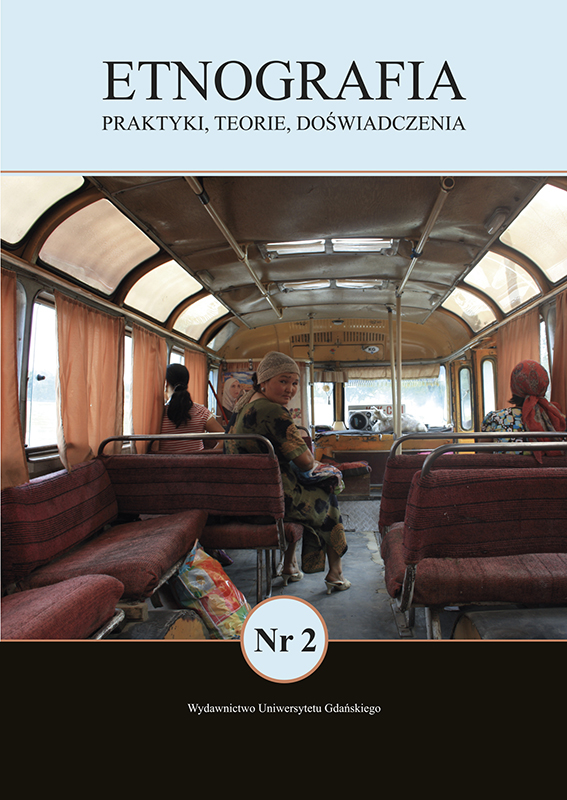Teren marzeń. Antropolog daleko w domu (przełożył Michał Żerkowski)
DOI:
https://doi.org/10.4467/254395379EPT.16.012.6491Abstrakt
The extent to which personal narrative is seen as a valid component of ethnography has been debated by generations of anthropologists. Critics contend that self-reflection trivializes the text, while supporters assert that self-reflection mediates contradictions between personal and scientific authority inherent in the discipline. Through such self-reflection and description, this essay challenges the basic fieldwork narrative in which notions of distance/nearness and foreign/native are imagined as bounded categories of experience.
Downloads
Bibliografia
Appadurai, A. (1991). Global Ethnoscapes: Notes and Queries for a Transnational Anthropology. W: R. Fox (ed.), Recapturing Anthropology: Working in the Present (pp. 191–210). Santa Fe: School of American Research Press.
Certeau de, M. (1984). The Practice of Everyday Life. Trans. by S. Rendall. Berkeley: University of California Press.
Clifford, J. (1992). Travelling Cultures. W: L. Grossberg, C. Nelson, P. Treichler (eds.), Cultural Studies (pp. 96–116). New York: Routledge.
D’Alisera, J. (1997). The Transnational Search for Muslim Identity: Sierra Leoneans in Americans Capital. Ph.D. dissertation, Department of Anthropology, University of Illinois at Urbana-Champaign.
D’Alisera, J. (1998). Born in the USA: Naming Ceremonies of Infants among Sierra Leoneans Living in the American Capital. Anthropology Today, 14(1), 16–18.
D’Amico-Samuels, D. (1991). Undoing Fieldwork: Personal, Political, Theoretical and Methodological Implications. W: F.V. Harrison (ed.), Decolonizing Anthropology: Moving Further Toward an Anthropology for Liberation (s. 68–87). Washington, D.C.: American Anthropological Association, Association of Black Anthropologists.
Gottlieb, A., Graham, P. (1993). Parallel Worlds: An Anthropologist and a Writer Encounter Africa. New York: Crown.
Gupta, A., Ferguson, J. (1992). Beyond „Culture”: Space, Identity, and the Politics of Difference. Cultural Anthropology, 7(1), 6–23.
Gupta, A., Ferguson, J. (1997). Discipline and Practice: „The Field” as Site, Method, and Location in Anthropology. W: A. Gupta, J. Ferguson (eds.), Anthropological Locations: Boundaries and Grounds of a Field Science (pp. 1–46). Berkeley: University of California Press.
Lavie, S., Swedenburg, T. (1996). Introduction: Displacement, Diaspora, and Geographies of Identity. W: S. Lavie and T. Swedenburg (eds.), Displacement, Diaspora, and Geographies of Identity (pp. 1–26). Durham: Duke University Press.
Marcus, G. (1986). Contemporary Problems of Ethnography in the Modem World System. W: J. Clifford, G. Marcus (eds.), Writing Culture: The Poetics and Politics of Ethnography (pp. 165–193). Berkeley: University of California Press.
Marcus, G. (1995). Ethnography in/of the World System: The Emergence of Multi-Sited Ethnography. Annual Review of Anthropology, 24, 95–117.
Marcus, G. (1996). Connected: Engagements with Media. Chicago: University of Chicago Press.
Myerhoff, B. (1978). Number Our Days. New York: Simon and Schuster.
Okely, J. (1984). Fieldwork in the Home Counties. Royal Anthropological Institute Newsletter, 61, 4–6.
Olwig, K.F., Hastrup, K. (1997). Introduction. W: K.F. Olwig, K. Hastrup (eds.), Siting Culture: The Shifting Anthropological Object (pp. 1–16). London: Routledge.
Ortner, S. (1997). Fieldwork in the Postcommunity. Anthropology and Humanism, 22(l), 61–80.
Passaro, J. (1997). „You Can?t Take the Subway to the Field!”: „Village” Epistemologies in the Global Village. W: A. Gupta, J. Ferguson (eds.), Anthropological Locations: Boundaries andGrounds of a Field Science (pp. 147–162). Berkeley:University of California Press.
Rosaldo, R. (1988). Ideology, Place and People without Culture. Cultural Anthropology, 3(l), 77–87.
Schwartz, L.S. (1996). Only Connect?. In: S. Birkerts (ed.), Tolstoy’s Dictaphone: Technology and the Muse (pp. 128–146). St. Paul: Graywolf Press.
Stoller, P. (1996). Spaces, Places, and Fields: The Politics of West African Trading in New York City’s Informal Economy. American Anthropologist, 98(4), 776–788.
Stoller, P. (1997). Globalizing Method: The Problems of Doing Ethnography in Transnational Spaces. Anthropology and Humanism, 22(l), 81–94.
Strathern, M. (1987). The Limits of Auto-Anthropology. W: A. Jackson (ed.), Anthropology at Home. ASA Monograph, 25 (pp. 16–37). London: Tavistock Publications.
Pobrania
Opublikowane
Jak cytować
Numer
Dział
Licencja
Czasopismo wydawane jest na licencji Creative Commons Uznanie autorstwa-Na tych samych warunkach 4.0 Międzynarodowe.

 Uniwersyteckie Czasopisma Naukowe
Uniwersyteckie Czasopisma Naukowe








